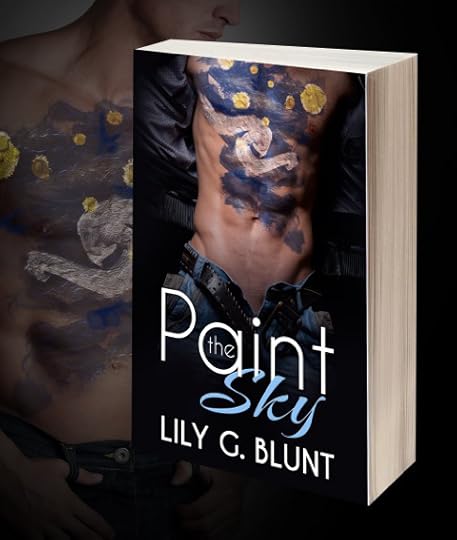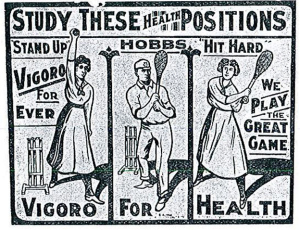Anna Butler's Blog, page 41
September 29, 2014
Basinets and Brassarts—Elin Gregory, Historical Romances, and A Taste of Copper
Hello and a great big thank you to Anna for inviting me here today to talk a bit about my latest release, a historicalish romp called A Taste of Copper.
Now why would an historical author be chatting on a sci fi blog, you may ask? Simple. Both Anna and I face problems with world building. In both science and history one has to use terms that don’t crop up in everyday conversation, nor in contemporary romances. One wants to make the story as appealing and accessible to as many readers as possible but there’s a fine line to tread between giving enough information to go on with and the dreaded info dump.
Take armour for instance. Here’s a picture: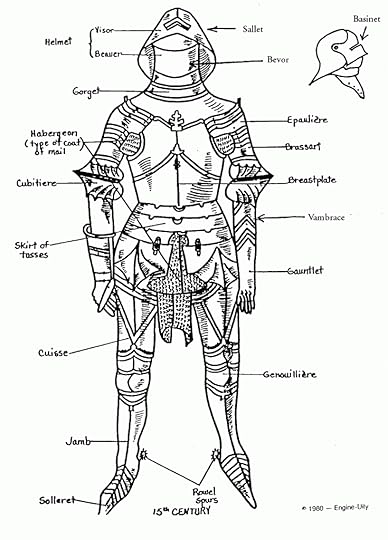
All those bits, all with specific names. If one wants to write a story about men in armour, especially putting it on, taking it off, touching each other in various ways, you need to refer to them. I was challenged several times by my betas – “But what does that mean?” – and clarified where I could, and removed bits I couldn’t, but in the end sometimes I just had to trust my readers to understand what I meant from the context.
For instance:
Maheris grunted and raised his left hand, ungauntleted now, to show it bright with blood. “A lucky stroke,” he said. “Reihershof’s point caught a chink in my brassard.”
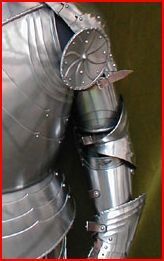 This bit between the elbow and shoulder is a brassard. Fingers crossed that a reader who has just read Maheris in a sword fight against a man called Reihershof will assume that brassard refers to armour in the hand/arm region.
This bit between the elbow and shoulder is a brassard. Fingers crossed that a reader who has just read Maheris in a sword fight against a man called Reihershof will assume that brassard refers to armour in the hand/arm region.
In dialogue I couldn’t have a knight, a specialist in his field, refer to his brassard as “my upper arm armour” any more than one could have a racing driver complain to his mechanic about extra play in his “pedal that slows the car down” or a scientist ask his assistant to pass the rack of “long narrow tubular vessels with rounded bottoms that we do tests in”. It may offer a more immediate mental image but it does detract from the character’s status as an expert and the readers who have bought the book because they like the specific terms will wonder what on earth you’re playing at.
On many occasions I’ve read things I didn’t properly understand – “Mongolian barbeque/an EMT/a SIG/a quark” – but have defined the term from context or from the author’s exposition or realised that they are just ‘local flavour’ and not really that important to the plot. As a writer I hope to have the readers’ trust that I’ll explain the things they really need to know about so they can accept the rest as part of the reading experience.
~~~
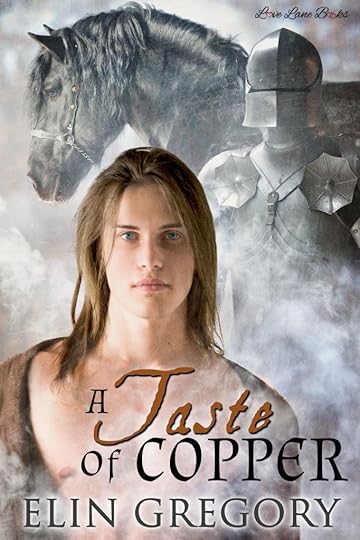 A Taste of Copper by Elin Gregory
A Taste of Copper by Elin Gregory
Your master has the field for today, but his name, whatever it might be, is without honour.
Olivier the squire worships the Black Knight and takes a fierce joy in his prowess as he defends a bridge against all comers. Olivier only wishes that his master loved him as much in return instead of treating him as a servant and occasional plaything.
Then word comes that the King desires to cross the bridge. With an army approaching, a bright eyed archer enticing Olivier to desert and the first cracks beginning to show in the Black Knight’s gruff demeanour, Olivier is left wondering if his honour is worth more than a chance for happiness.
Word count: 25,900
Cover Art: Meredith Russell
Editor: Erika Orrick
Copyright: Elin Gregory
Read the whole of the first chapter here.
Buy Links




Many thanks to Love Lane Books for organising a Rafflecopter giveaway with a very generous prize. Check it out!


September 18, 2014
Season of mists and pumpkin soup
I love this time of year.
If, like me, you’re a temperate climate sort of girl, then autumn is everything you could ask for. The days are still warm but the sun isn’t sledgehammering you into the ground; mornings and evenings are cool and fresh and perfect for walking the Deputy Editor, aka Molly the cockerpoo.
I have to admit that Molly is not a morning dog, and some days I end up having to tip her out of bed to get her up to make it to the park for her morning constitutional. Teenagers, eh? Lazy slug-a-beds.
The trees in our local park (a plot of land Molly regards as her own and that she guards fiercely against invading squirrels) are just starting to turn yellow. Another few weeks and they’ll be that glorious russet red that my hair never quite achieved, even with the help of henna. Conkers are everywhere in the park this year—a bumper crop, if only children these days knew what to do with them—and walking under the trees poses a real risk of your being bonked on the head by acorns hurling themselves enthusiastically ground-ward. I have started my usual collection of conkers and acorns to fill bowls in the house. There’s an old 1920’s teacup full of shiny brown conkers and one sprig of turkey oak leaves with its acorn still attached, right beside the computer to remind me of autumn every time I lift my head.
in our local park (a plot of land Molly regards as her own and that she guards fiercely against invading squirrels) are just starting to turn yellow. Another few weeks and they’ll be that glorious russet red that my hair never quite achieved, even with the help of henna. Conkers are everywhere in the park this year—a bumper crop, if only children these days knew what to do with them—and walking under the trees poses a real risk of your being bonked on the head by acorns hurling themselves enthusiastically ground-ward. I have started my usual collection of conkers and acorns to fill bowls in the house. There’s an old 1920’s teacup full of shiny brown conkers and one sprig of turkey oak leaves with its acorn still attached, right beside the computer to remind me of autumn every time I lift my head.
I marked the change of seasons tonight with my first vat of spicy squash soup. It’s a staple of my diet from the first days of autumn through to the first days of spring. Nothing says the year’s turning its face towards its close louder than sitting with my feet up, sipping on a big mug of bright orange soup while watching Eggheads on the telly.
I’m very rarely domesticated. But here’s the recipe, so you too can have a bowl of spicy autumn-ness.
2 medium onio ns
ns
50g butter
1kg pumpkin or butternut squash
1 tbs coriander seeds
2 tsp cumin seeds
1 litre vegetable stock
Peel and roughly chop the onion.
Peel the pumpkin or squash, taking out the nasty stringy bits and seeds. Chop into rough cubes. Any bits that fall on the floor are fair game and Molly will eat them. She’s a gannet, that dog, and adores crunchy vegetables.
Toast the coriander seeds and cumin in a small pan over a low heat for about two minutes. Grind using a pestle and mortar – it’s good exercise and the kitchen smells divine.
Right then.
Melt the butter in a large, heavy-based saucepan and cook the onion until soft and translucent. Add the pumpkin/squash cubes and spices and let them brown for a minute or two, but there’s a lot of pumpkin/squash and very little butter and honest, I often don’t worry about it browning and just toss in the  stock.
stock.
So. Add the stock. Simmer for 20 minutes or so until the pumpkin/squash is tender. Blitz and whizz with a blender until it’s smooth. Check the seasoning.
Serve piping hot. If you’re feeling devilish, you could swirl some single cream through it and scatter crispy-fried bacon bits on top, but it’s almost as lovely without. Serves 4. At least.
Have a lovely autumn. Enjoy this very best part of the year.


August 28, 2014
Devils, Details and Design
The details are not the details. They make the design.
Charles Eames, architect and designer
One of the odd traits of civil servants is that certain things are ingrained in us by years of researching ‘stuff’ for ministers. Obviously, when I was still working for Her Maj—I am now a civil servant of the ‘ex’ variety—I was researching in the hope we could turn ministers from their (usually) cockeyed ideas and pet enthusiasms and persuade them to do something, you know, sensible for the good of the country instead. Looking at the state we’re in, maybe we were better at researching than we were at persuading.
The point is, though, is that it becomes second nature to build up examples of said ‘stuff’. And you get to like lists. And, boy, does that help when you’re world building.
Don’t sigh. It’s a necessary thing for you to do. Even if you’re writing a contemporary novel, you need to know about the culture and society, even the geography and weather of the place you’re setting it. That way you get the details right, make the story feel right, have your characters acting and speaking right. It’s to make sure that things don’t jar. Real things, real places, reality infused through your story.
I’ve talked before about world building and some of the things to think about when you’re doing it—here, if you’re interested. There the approach I suggested is, sort of: think of something that matters (infrastructure? political? social?) and then decide how it all works in your world. Then take the next issue you need to think about, rinse and repeat until you have a good understanding of what your imaginary world is like. And if you’re anything like me, you have a folder three inches deep with that wonderful ‘stuff’ I mentioned earlier.
The end result should be a world with sense of completeness, of integrity, of coherence. Albion exists for me, and a Victorian steampunk Londinium exists for me, because I’ve thought about them and worried away at aspects of them until I know how things works and how the ‘stuff’ fits together. So I know exactly which building in Museum Street is Rafe’s coffee house, and where in Barnet I’ve sited the aerodrome—Friary Park, if you’re interested;a real park if not a real aerodrome. I’ve thought through everything I think will help enrich my story, from the system of government to how the darn plumbing works.
And once you’ve done all that, once you’ve thought through how the politics work, the economy, how education’s provided… what then? How do you use it?
Well, that’s where the detail comes in. The thing the Devil’s in. The thing the design’s in.
Details give your created world that completeness and coherence. They make your narrative three dimensional. Rich. Oh of course, not all of it is up front and in your face; but they inform your story, threaded through it like beads on a string. Things you’re consciously putting there to catch at your reader’s attention, hopefully subtly and naturally. Making the world live.
In Gilded Scarab, I try very hard not to draw attention to the steampunky bits. Why would I? Rafe’s my narrator and it’s his voice talking to us. The steampunky bits are as natural to him as breathing. He doesn’t leap up and down yelling at the reader to notice his phlogiston-powered pistol or an aeroship. They’re just there. In the background. Unremarkable to him as a character, so unremarkable to him as narrator. They’re the little details that make the world as he knows it and what he shows the reader.
My Shield folder is three inches thick with details: pictures of star ships, character studies, a timeline six pages long, a perpetual calendar for Albion, lists of ships in Fleet, images of people, places and things that inspired me, even an organisation chart for the military… everything. Some of it’s real and, well, some of it isn’t. But put it all together, and you have all those building blocks, the lovely details that are where the design is, that build the world my hero lives in and that breathe some life into it. That make it all satisfyingly real.
But here’s another thought.
One of the delights of writing science fiction not set on Earth, or writing a steampunk Victorian London, is that the worlds, the culture and society, the government, the geography and the weather are all entirely up to you. You can, you know, make stuff up. Shocking, isn’t it? And equally shocking, not to mentioning liberating: you can get some of the details wrong, or twist them to suit your story. I mean I can write something like this in my background notes with a straight face, and who is going to say me nay?
On the ground, a Shield warrior has his or her Shield suit: close-fitting, black, heat reflecting material threaded through with wiring (masking circuitry) powered by a flat battery pack across the shoulders and upper back. It produces a form of interferomatic dispersion that modulates to scatter radar and infra red/ultra violet sensors – a layer of energy distortion creating a refractive, reflective shield (in a play on the Regiment’s name).
 It sounds scientific enough, doesn’t it? Sci-fi-ish. It has a basis in fact. What I did was research interferometry (the technique of combining and superimposing electromagnetic waves to study displacements, refractive index changes and surface irregularities) and thought Wow. Okay. If I give that a jump to the left and a step to the right, not to mention turning it on its head and shaking it to see what falls out of its pockets, that sounds like it could be science-y sounding and feasible as a cloaking device. All right, an astronomer or a physicist would probably birth a cow if they read that paragraph about the Shield suit, but hey, a little bit of me is with Sir Arthur Conan Doyle here:
It sounds scientific enough, doesn’t it? Sci-fi-ish. It has a basis in fact. What I did was research interferometry (the technique of combining and superimposing electromagnetic waves to study displacements, refractive index changes and surface irregularities) and thought Wow. Okay. If I give that a jump to the left and a step to the right, not to mention turning it on its head and shaking it to see what falls out of its pockets, that sounds like it could be science-y sounding and feasible as a cloaking device. All right, an astronomer or a physicist would probably birth a cow if they read that paragraph about the Shield suit, but hey, a little bit of me is with Sir Arthur Conan Doyle here:
“It has always seemed to me that so long as you produce your dramatic effect, accuracy of detail matters little. I have never striven for it and I have made some bad mistakes in consequence. What matter if I hold my readers?”
I’m not saying he’s entirely right. I like collecting that stuff, remember? I like researching. I like facts and I just love using those details to seed through the story to give it its air of verisimilitude. But in the sense in which he is right, is that what matters is the story. I’m not writing a treatise on interferometry. I’m writing a science fiction yarn involving a fit young man in a tight Shield suit out to save humanity. If I end up bending those electromagnetic waves a little too far to the left to please the scientists, but the reader just thinks “Cool suit!”, then job done.
It’s all about balance, see? Blending your imagination with all that stuff you’ve collected together, and seeding those details through your narrative so quietly and seamlessly your reader just sees the whole, complete world and never has to worry about the plumbing, because you’ve done it for them.
Good world building and judicious use of the lovely little details that come out of it won’t get your reader to suspend disbelief. It’ll get them to believe, instead.
This post is a thin excuse to point out that I’ve redesigned the website slightly to start including some of the ‘stuff’ I’ve collected when writing Shield or The Gilded Scarab. I’ll add to these pages as publication dates draw closer. Do explore them to find out fascinating things such as what Stravaigor means or which dreadnought heads up the Ninth Flotilla. Enjoy!
Devilish details shared here: Taking Shield and The Gilded Scarab.


August 22, 2014
Paint the Sky: announcing a new book from Lily G. Blunt
One with the nicest cover I’ve seen in quite some time!
On 30 August, Lily’s new book, Paint the Sky, is published. It’s currently available for pre-order, so you can be sure of getting it the minute it’s available.
A love of art…
A mutual interest in art draws two shy university students together. Ben admires Vinnie’s painting of the university building, so Vinnie invites him to an exhibition of his artwork. From a wealthy family, Ben purchases some of Vinnie’s art and arranges for the artist to personally hang the paintings in his apartment.
Starry, starry night…
Ben commissions Vinnie to paint his portrait, in order to spend more time with the artist. On the night of the sitting, Vinnie fingerpaints the starry night on Ben’s chest… and they kiss. They begin a relationship beneath the night sky, God’s own canvas.
But every relationship has its ups and downs and so it is with theirs. When Ben thinks Vinnie spends too much time with a fellow artist, his jealousy drives a wedge between them and forces Vinnie into the very thing Ben dreads.
Hold tight to your dreams…
Ben and Vinnie will have to walk through fire before they can find one another again. But if they believe, and if they keep their faith in the night sky and each other, just maybe they can make their dreams of love come true.
See what I mean about that cover? It’s sensational, isn’t it? I love the texture of the paint on Ben’s chest. Just gorgeous.
And here’s a teaser to get your appetite whetted:
Vinnie led me across the room, pulling me by the shirt. “Lie back on the sofa for me and I’ll paint you.”
As if in a dream, I settled my head against one arm of the sofa, my legs dangling over the other end, scarcely breathing now. Vinnie knelt on the floor beside me with an open pot of paint in his hand.
Teasingly, he dipped his index finger into the dark blue paint as if it were cream he would lick off. His finger connected with my skin and he made short strokes across my chest, the coldness of the paint making me shiver.
Mesmerised by the closeness of his beautiful face, the view of the night sky through the window, and the picture forming upon my chest, I watched as dab after dab and stroke after stroke he built up a mix of shades, until a dark night sky with the moon and stars were there to be seen—a masterpiece, drying on the warmth of my blazing skin, a transient thing of beauty. His fingers skimmed my skin causing gooseflesh to ripple in waves down my arms and thighs. My nipples pebbled in response to his touch.
And when he was done, his lips met mine in a languid kiss; how our first kiss should have been—sweet, innocent, and full of promise. He pulled away, smiling down at me.
This was the beginning of something special.
PREORDER Paint the Sky:
Lily G. Blunt writes contemporary gay romance and erotica. She loves to explore the relationship between two men and the intensity of their physical and emotional attraction. Angst often features in her stories as she feels this demonstrates the depth of the men’s feelings for each other. Lily is forever writing imaginary scenes and plots in her head, but only a few ever make it to the page—there never seems to be enough hours in the day despite having left the teaching profession to concentrate on her writing!
Find Lily at her website: http://lilygblunt.wordpress.com and on Facebook at http://www.facebook.com/LilyGBlunt
And just because I can, here’s another version of that gorgeous cover:


August 20, 2014
More good news on the publishing front
I’ve just signed the contract for The Gilded Scarab to be published by Dreamspinner Press in Feb/March next year.
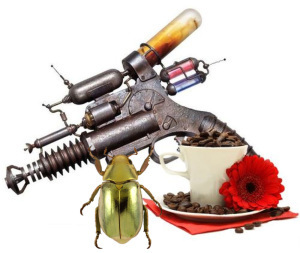 Gilded Scarab is a steampunk m/m romance/adventure novel. When Captain Rafe Lancaster is invalided out of the Britannic Imperium’s AeroCorps after crashing his aerofighter during the Second Boer War, he arrives in Londinium in late 1899 with no career, very little money, and no idea about what he wants to do for the rest of his life. Everything changes when he buys a coffeehouse near the Britannic Museum. In a society ruled by an elite oligarchy of powerful families, Rafe must navigate House politics, deal with jealous lovers, learn to make the best coffee in Londinium and fend off assassination attempts before he can find love and happiness with Aegyptologist Ned Winter.
Gilded Scarab is a steampunk m/m romance/adventure novel. When Captain Rafe Lancaster is invalided out of the Britannic Imperium’s AeroCorps after crashing his aerofighter during the Second Boer War, he arrives in Londinium in late 1899 with no career, very little money, and no idea about what he wants to do for the rest of his life. Everything changes when he buys a coffeehouse near the Britannic Museum. In a society ruled by an elite oligarchy of powerful families, Rafe must navigate House politics, deal with jealous lovers, learn to make the best coffee in Londinium and fend off assassination attempts before he can find love and happiness with Aegyptologist Ned Winter.
The steampunk coffee shop romance is a go!!
Of course, with the first Shield novel due out with Wilde City in January, I will have two books going through editing at the same time. Quails at the thought…
But, well, YAAAAAYYYY!!!


August 13, 2014
Text layout, fonts, styles—Eff it! I just want to write my damn book!
I am looking for a wall right now, for the better beating of my head. I have the first compiled draft of Makepeace in front of me, and I’m agonising about how to ‘chunk it up’. It’s annoying when the formatting of the text is taking me more time to sort out than the actual content of the novel itself.
In Makepeace, more than any other of the Shield stories, the date/place of each chapter/section is important. It’s the kind of thing where on TV or films, you have the little caption writer type it out at the bottom of the screen: Makepeace Colony, Septimus 6217. It’s *easy* when it comes to TV! But poor me has to try and find a way of doing that in text.
I’m including subtitles where I need to. The issues come when
the scene/incident is too long to be held within a single chapter, but covers two or three of them; or
where there are date/place shifts within chapters, each two or three pages long.
I’m trying to come up with a way of doing this that is simple and – above all – clean and unfussy. It’s proving to be quite hard to do that. Yes, I can litter the text with subheadings, but when it comes to the first one, where the action spreads over two or more chapters, do I have to keep littering it with subheadings, so the reader doesn’t get lost? That’s where it stops being clean and unfussy.
I thought of taking the text out of chapters altogether, and having, instead, a series of scenes, each with their date/place as sort-of-chapter-titles. They’d vary in length from two/three pages to twenty or thirty. But when we get to Section 3, when Bennet reaches Makepeace, there are fifty or sixty pages that would all sit under the same sub-heading. I mean, Great Wall Of Text, Batman! That has to be split into manageable sub-sections, somehow.
I’m going slightly nuts here trying to work out how to split the text up into manageable, readable chunks.
And you know, it’s not what’s important. What’s important is the story. Right? I know that. I hope that readers will just want to know what Bennet is going to find on Makepeace and then sit with him through the aftermath, holding his hand and saying “There! There!”. I know that. Truly I do.
Trouble is, I’m a visual person as well as a words one. How it will all look on the page, how to make it easy to follow and accessible using the tools the compositor gives us—text, fonts, layout—is important to me too.
So, what would you do? Have you ever faced the problem where your novel (and I’m talking nearly 90k words here) doesn’t split itself into nice easy chapters but wants to be split in other, less handy ways? Any advice to offer?


August 7, 2014
Gnat Bites and Button Thieves
I had this whole post planned about how I’m finding it harder and harder to be philosophical about the shit life throws at people. How, if Stoicism is that handy thing for a writer to shrug on when needed, like a winter coat when the rain starts, then someone’s sneaked up on me and nicked the buttons.
Mostly I’ve been reflecting on how a (slight) bodily infirmity can screw with you Big Time. For most of this year, I’ve been feeling tired. Not just a little bit tired, but sleeping away the entire afternoon tired, fuck-do-I-have-chronic-fatigue tired. Achey. Old. Down at the mouth a bit. It was exacerbated in early June by the Chest Infection From Hell (©) and that walloped me like a runaway train. Mowed me down. I was downright shaky on the old pins at times.
Nothing serious! All this is, apparently, is Vitamin D deficiency. Otherwise I am your proverbial horse when it comes to bodily health. Take a pill a day for a year and you’ll be fine, quoth the GP. Except I am still tired and achey and I have a headache and tinnitus so bad the entire world resonates along with it. And the publisher I sent Gilded Scarab to still hasn’t responded, six weeks later.
And there it is! The point where my philosophy started deserting me.
I have less resilience than I used to. I’m finding it harder to shrug and say “Hey, they say it takes up to eight weeks and you still have two to go. Stop blethering, you idiot, stiffen up that lip and wait.” I can’t say that, because whoever it was nicked my coat buttons, is also whispering in my ear: “Huh. If they liked it they’d have got back to you by now. It wouldn’t still be at the back of the queue. It’s shite, you’re shite and why don’t you turn off the PC, sew on a couple of buttons and then take a nice nap?”
You know, it takes a real effort to turn on the button-thief, stare him in the eye, ignore his soft-voiced I told you so!s and respond with the deeply philosophical argument of a resounding “Fuck you!”
God knows, compared to some of my writer friends, I have it easy—you know who you are and that I wish to god my superpower was the ability to reach through the PC monitor and smoosh you, because you are great and you deserve nothing but love and happiness.
I am LUCKY. I don’t get silenced, I’m not oppressed, I am (in material terms) comfortably off with an assured income and no debt. Hell, that’s so lucky compared to those of you who struggle, and I’m not even going places where poverty, want and war cause real misery and suffering and death. I’m fucking lucky. I know it. But today this is me complaining about little itsy bitsy gnat bites of unhappiness, of things that attack us when we’re at our most vulnerable, who come and steal the whole damn coat and then spit out the buttons at us over their shoulders, derisively, as they dance all over us.
 It’s hard to be cheerful all the time. It’s damned hard to be hopeful all the time. It’s even worse when you know the gnat bites are as nothing compared to the shit that happens all around you and you are being a selfish, self-absorbed twat who deserves a genteel kick up the arse.
It’s hard to be cheerful all the time. It’s damned hard to be hopeful all the time. It’s even worse when you know the gnat bites are as nothing compared to the shit that happens all around you and you are being a selfish, self-absorbed twat who deserves a genteel kick up the arse.
But this is my new philosophy. I acknowledge that they’re gnat bites. But if I deny myself the gnat bites because of being sooooo far down in the competition line of misery, I’m allowing myself to be silenced. That’s not healthy. So, instead, I’m giving myself the two minutes it takes to read this sorry-for-itself, whinge-fest of a post to wallow in the misery of the gnat bites, and then I’m turning on the button-thief with that very loud dismissal.
Fuck you!
And yes, I do feel better. Thank you for asking.
Mind you, waiting is still pretty hard. I do wish the publisher would hurry up!


July 22, 2014
Vigoro—or why research is good for your health
One of the delights of writing, it seems to me, isn’t about publication and sales and all that jazz—though of course those are hugely, hugely, delightful things that make it all worthwhile. What I mean is there are other things that, to quote my favourite teacher, ‘bewitch the mind and ensnare the senses’ and that can be ranked right up there as one of the rewards of a writer’s life.
Research.
Oh, I know. A lot of people sigh, gird up their loins, and plug at it as a job that has to be got through to give them enough understanding to get on with the story they want to write. Often I’m like that, too. I need to know what gunmakers other than Colt were active in the American West, just for a passing reference? Cool. Do that, drop the reference in (He hesitated over a neat .44 Smith and Wesson he hadn’t seen before—a new model, called the Russian, said Zimmermann—but put the other Smith and Wesson pistols and the Remingtons to one side. The Le Mat wasn’t worth looking at.) and move briskly on. Same with racehorses and riders in the 1899 Boxing Day races at Kempton Park: look ‘em up, drop them in, congratulate yourself on adding ‘merely corroborative detail, intended to give artistic verisimilitude to an otherwise bald and unconvincing narrative’.
But now and again, you come across an article, a reference, a thing that is so thoroughly delightful that your day is brighter just for knowing it.
When I was writing Gilded Scarab (and as an aside, don’t you *hate* the waiting period while the publisher is looking at it and hasn’t yet given you either an offer or a ‘bugger-off-Anna’ response?), one of the absolute joys was the Ordnance Survey Map of London of 1893-6, which superimposes over the modern map and works in much the same way as Google Maps does. I spent hours and hours over that, working out Rafe’s route to Daniel’s rooms in Kings Cross, for example, or Ned’s route from Belgravia to the British Museum. I was gobsmacked to find that Coptic Street was known as Duke Street then. Who knew? Making that change to my draft made me feel rather… smug. Historically accurate, and smug.
This too, was a great find: the 1894 plan of the British Museum. Very useful for plotting out my hero’s route through to the basements in a power-cut, to rescue Ned from the baddies.
Now, I’m not seriously researching the second Rafe and Ned book yet. I’ve almost finished the revision of the third Shield book and I want the fourth in the bag before I turn my attention to The Dog Who Ate Millions. But I do keep my eye open for things that will be relevant. So god bless the BBC and their quirky, eclectic online magazine. Today’s article: Vigoro: The Edwardian attempt to merge tennis and cricket
They tried to merge cricket and tennis. Let me repeat that: they tried to merge cricket and tennis.
They had the bowler (server? Pitcher, for my US friends) deliver the ball by serving it with a tennis racquet. He served the ball to the batsman using a tennis racquet. The sheer WTFery of that is… well, using that overused adjective-du-jour, delightful.
Dee-light-ful.
My favourite line is “Fielders were expected to catch the ball by holding the racket at an angle and lobbing it in the air, then bringing it to rest on the face. They returned the ball by whacking it in.”
I want to go and see a game of Vigoro, dammit! I wanna go and see it.
The best I can do is make sure I use it somewhere. I’m going to have to cheat a bit and bring it forward to 1900 (1902 is a little late for my story) but I swear by all that is holy that if I can’t go to see a game of Vigoro, Rafe and Ned ruddy well will.
And they will cheer and clap and be entranced. Just the way I am.
And on another note, the first Shield book, Gyrfalcon, is likely to be published on a Wednesday in January next year. I don’t know which Wednesday, but still. A Wednesday. I love Wednesdays.


June 23, 2014
Squeeing like a very squeeing thing
A very short post to say that w ith thanks to Baldrick for the title, I’m squeeing very hard indeed today.
ith thanks to Baldrick for the title, I’m squeeing very hard indeed today.
I signed the contract with Wilde City this morning for the first two Shield books in the series. Bennet and Flynn are on their way!


Squeeing like a very squeeing thing
A very short post to say that w ith thanks to Baldrick for the title, I’m squeeing very hard indeed today.
ith thanks to Baldrick for the title, I’m squeeing very hard indeed today.
I signed the contract with Wilde City this morning for the first two Shield books in the series. Bennet and Flynn are on their way!






